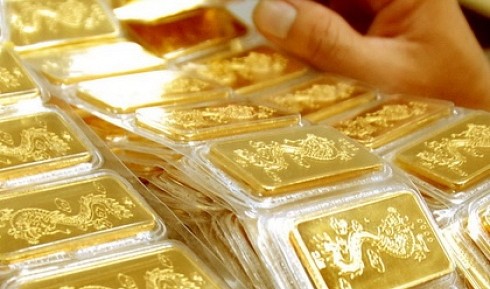Cbank says gold bidding not to stabilize prices

The deputy governor was surrounded by questions regarding the central bank’s management policies toward the gold market which repeatedly made national headlines over the last few months.
Here is a brief Q&A from the meeting.
* Why is there a huge disparity between domestic and international gold prices?
Over the last two years, the central bank did not license raw gold material imports for gold bullion making, which led to the price gaps.
On the other hand, there is huge demand from the country for gold bullion, especially from credit institutions which need the precious metal to settle loans and deposits in gold.
Another reason is that as of April 12, international gold prices slumped dramatically, enlarging the price disparity.
Since the intervention of the central bank into the gold market, even though there is indeed the price gap between local and global gold prices, there are no longer market instabilities or ‘gold fever’ that can affect the macro-economy. Specifically, the foreign exchange market has since remained stable.
* So did the SBV achieve its target from the gold bidding?
By holding gold bullion bidding sessions, the central bank meant to increase supply, which is an important factor to reduce demand pressure in the market.
Supposing that the central bank had not stabilized the market, while the gold import ban remained valid, the market would have fluctuated even more, and prices would have skyrocketed as supply failed to meet demand.
After 12 bidding sessions, the central bank has supplied more than 12 tons of gold into the market, and we reached the aim of increasing supply and reducing demand.
* So the increased supply is intended to help banks that need gold to repay their gold bullion depositors?
Technically speaking, the central bank can sell directly to banks, but the bidding is to maintain transparency.
Banks are allowed to use part of the gold to settle deposits or sell into the market.
* It is said that after June 30, when banks have completely settled their gold deposits, domestic gold prices will be equal to their global counterparts. So does the central bank know when will the price gap be removed?
The central bank has stated clearly before it began the gold bidding policy that the move is to stabilize the market, and the central bank does not mean to stabilize gold price.
It means that via the gold bullion bidding, the central bank does not aim at pulling down domestic gold prices, but only focuses on increasing supply to reduce market pressure.
All of the disparity the central bank gained from the bidding is contributed to the state budget.
While banks were banned from mobilizing gold deposit since November 25, 2012, there are still some gold savings with maturity until June 30. This is why credit institutions have to increase purchases.
When all of these deposits are settled, demand will come down and the price gaps will gradually narrow down.
What the stars mean:
★ Poor ★ ★ Promising ★★★ Good ★★★★ Very good ★★★★★ Exceptional
Latest News
More News
- Cashless payments hit 28 times GDP in 2025 (February 04, 2026 | 18:09)
- SSIAM and DBJ launch Japan Vietnam Capital Fund (February 04, 2026 | 15:57)
- Banks target stronger profits, credit growth in 2026 (February 04, 2026 | 15:43)
- Vietnam on path to investment-grade rating (February 03, 2026 | 13:07)
- Consumer finance sector posts sharp profit growth (February 03, 2026 | 13:05)
- Insurance market building the next chapter of protection (February 02, 2026 | 11:16)
- NAB Innovation Centre underscores Vietnam’s appeal for tech investment (January 30, 2026 | 11:16)
- Vietnam strengthens public debt management with World Bank and IMF (January 30, 2026 | 11:00)
- Corporate bond market poised for stronger growth cycle (January 28, 2026 | 17:13)
- Vietnam's IPO market on recovery trajectory (January 28, 2026 | 17:04)
















 Mobile Version
Mobile Version